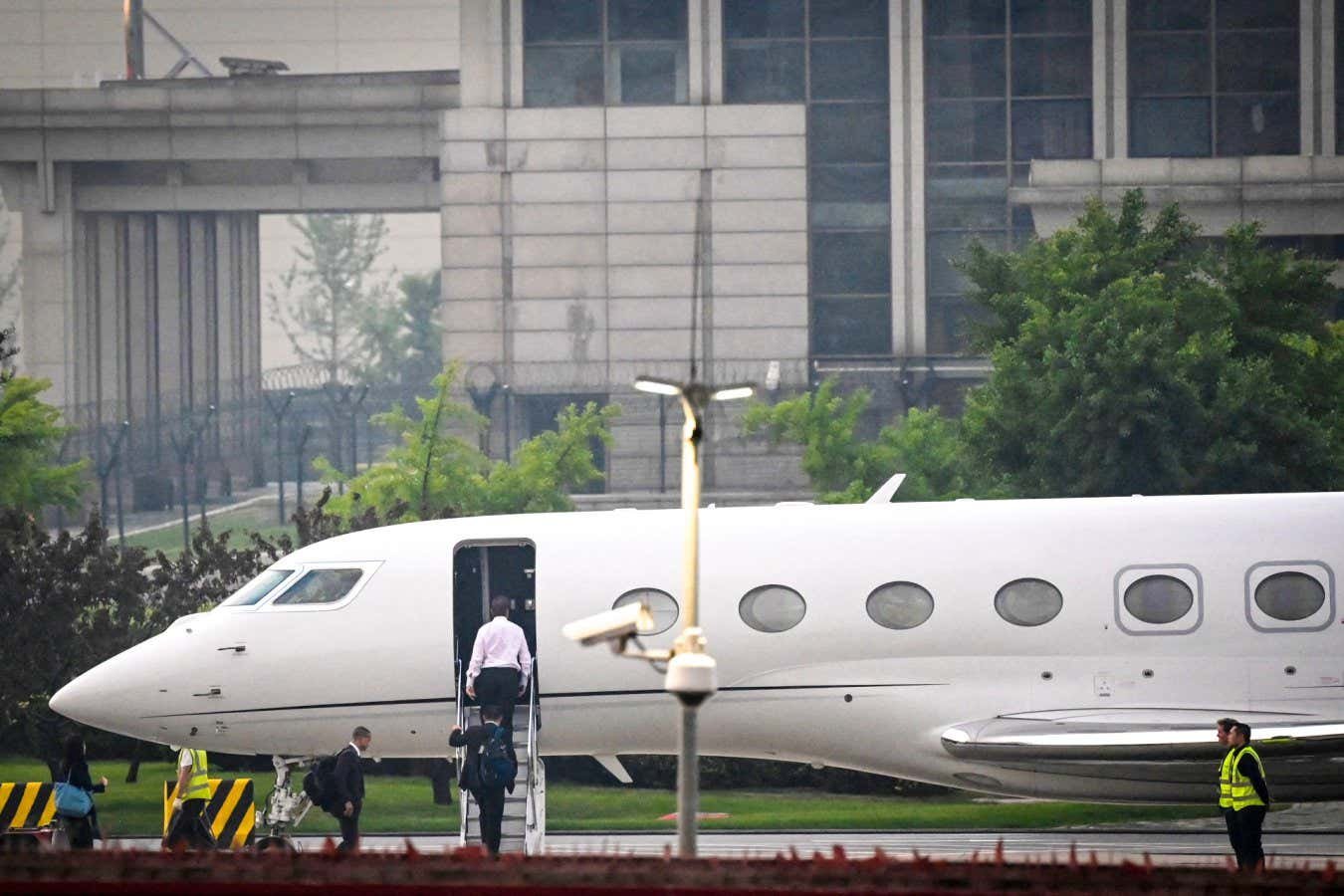
Elon Musk boards his private jet in Beijing in 2023
JADE GAO/AFP via Getty Images
Flights taken on private jets should be subject to a carbon tax to curb the runaway growth in carbon emissions from the sector, researchers have said.
Emissions from private aviation jumped 46 per cent between 2019 and 2023, according to analysis of 18.7 million flights by almost 26,000 aircraft.
Flights were mainly for leisure reasons, with 1846 private flights to the 2022 FIFA World Cup in Qatar alone. Other popular destinations were the Cannes Film Festival, the Super Bowl, the COP28 climate conference in Dubai, and the World Economic Forum in Davos. Trips to the south of France, Ibiza and other destinations in Spain peaked during the summer months as travellers jetted in for long weekends of sun.
“A rather small group of very wealthy individuals, because of their lifestyles and investments, is pushing emissions quite quickly up,” says Stefan Gössling at Linnaeus University, Sweden.
Alongside colleagues, Gössling used flight tracker data for millions of flights to build a picture of private aviation use around the world.
Flying by private jet is the most polluting way to travel, with a single flight emitting 3.6 tonnes of CO2 on average, equivalent to the annual carbon impact of someone living in Sweden.
Most flights on private jets are short, the analysis found, with almost half of all flights covering a distance less than 500 kilometres. Most were within the US and Europe.
Total emissions from private jets in 2023 were 15.6 megatonnes of carbon dioxide, equivalent to the annual emissions of Tanzania. That is up from 10.7 megatonnes in 2019.
Growth rates were distorted by the covid-19 pandemic. Unlike commercial aviation, which was heavily restricted in 2020 and 2021, private aviation only showed a small dip in flight numbers and emissions in 2020 before rebounding to growth the following year.
Many of the most extensively used private jets are owned by very rich celebrities, including Tesla CEO Elon Musk, former Google CEO Eric Schmidt, pop star Jay-Z and entertainment personality Kim Kardashian, according to data compiled by the website Celebrity Jet.
“This is about the inequality in the production of greenhouse gases,” says Mark Maslin at University College London. “It’s not even the 1 per cent – it’s the 0.1 per cent richest people in the world who click their fingers and use a private jet.”
The high personal emissions of the super-rich risks eroding public appetite for cutting personal emissions, says Gössling. “If the very wealthy don’t don’t have to reduce their emissions… then we don’t have any reason for anybody else to reduce their emissions, because everybody else is emitting less,” he says.
Gössling would like to see a carbon tax applied to private jet use. “We can put a price tag on every tonne [of carbon] that is emitted, and I think everybody will agree that it’s fair that the affluent should pay the cost of the damage that they are causing,” he says.
Others would like governments to go even further. Sean Currie at the campaign group Stay Grounded wants to see a total ban on the use of private jets. “Around half of these flights are short-haul flights,” he says. “They could easily be replaced by trains if we were to ban private jets and then invest in real infrastructure.”
Topics:

Felecia Phillips Ollie DD (h.c.) is the inspiring leader and founder of The Equality Network LLC (TEN). With a background in coaching, travel, and a career in news, Felecia brings a unique perspective to promoting diversity and inclusion. Holding a Bachelor’s Degree in English/Communications, she is passionate about creating a more inclusive future. From graduating from Mississippi Valley State University to leading initiatives like the Washington State Department of Ecology’s Equal Employment Opportunity Program, Felecia is dedicated to making a positive impact. Join her journey on our blog as she shares insights and leads the charge for equity through The Equality Network.




